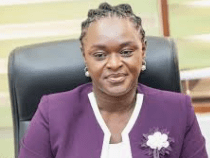By Evelyn ARTHUR
The Environmental Protection Authority (EPA) of Ghana has raised concerns over increasing emissions of hazardous substances from the shipping sector, warning that these threaten environmental safety.
Professor Nana Ama Browne Klutse, Executive Director of the EPA, made the call during her keynote address at a conference in Accra to conclude the Port Effectiveness and Public Private Cooperation for Competitiveness (PEPP II) Project on sustainable port, shipping and maritime development in Africa.
The conference brought together researchers, experts, policy-makers, industry players and regulators to discuss the project’s findings and rally support for implementing recommendations aimed at reversing the negative trend of marine-related environmental pollution.
“For decades, the shipping industry has been a silent contributor to environmental degradation. The heavy fuel oils used in ships release high levels of carbon dioxide, sulphur oxide and nitrogen oxide, contributing to climate change, acid rain and severe air pollution,” Professor Klutse stated. She pointed to the situation in Tema, where emissions from vessels, cargo-handling ships and port operations are affecting air quality and public health.
She further noted that the problem is exacerbated by oil drilling activities, necessitating urgent and pragmatic measures to curb environmental pollution. However, she expressed optimism that solutions are available, including a transition to a greener, more sustainable shipping industry that balances economic growth with environmental responsibility.
“So the good news is that solutions exist, and Ghana has the potential to lead Africa’s transition to sustainable maritime practices. However, this will require bold action, strategic investment and a strong policy framework,” she said.
Professor Klutse stressed the need for Ghana to align with the International Maritime Organization’s (IMO) goal of reducing global shipping emissions by 50 percent by 2050. “This means promoting the use of low-sulphur fuel, liquified natural gas, biofuels and hydrogen-based fuels. Our economy can explore local production of alternative marine fuels, creating new economic opportunities while reducing dependency on imported fossil fuels,” she added.
She called on regulators to enforce stricter environmental compliance standards to ensure that all vessels calling at Ghana’s ports meet international emission reduction targets. “However, regulation alone is not enough.
We must also create incentives such as tax breaks, green financing and subsidies to encourage shipping companies to adopt greener technologies and sustainable practices,” she said.
The Director-General of the Ghana Maritime Authority (GMA), Dr. Kamal-Deen Ali, also highlighted global efforts to decarbonise shipping, targeting zero use of hydrocarbons in the industry by 2050. He revealed that in the coming weeks, the Minister of Transport would lead a Ghanaian delegation, including himself, to another IMO conference where transformative decisions on maritime pollution would be made.
Dr. Ali commended the PEPP II Project, saying it addresses past shortcomings by fostering stronger collaboration between regulatory agencies and research institutions. “For far too long, we have moved in a direction without clear policy guidance or a strong foundation.
What this project seeks to do is to provide that solid knowledge base upon which policy decisions can be made to effect the needed change in the maritime sector,” he noted.
Professor Annette Skovsted Hansen from Denmark, a partner in the project, expressed satisfaction with the growth of Ghana’s maritime industry and encouraged continued efforts to consolidate this progress.
Presenting an overview of the project’s findings, Professor Hansen called for urgent measures to promote sustainable job creation while addressing environmental challenges in the shipping and maritime sectors.
The Dean of the University of Ghana Business School, Professor Justice Nyigmah Bawole, urged the project leaders to ensure the continuation of such research initiatives, stating that they are critical to reforming Ghana’s maritime industry.










